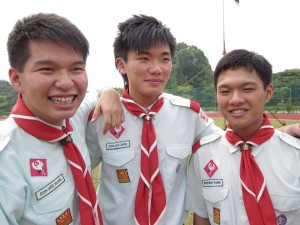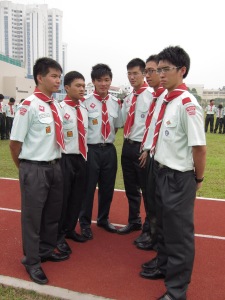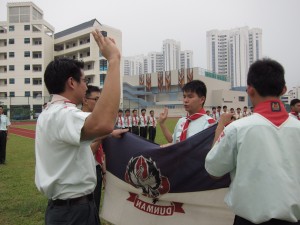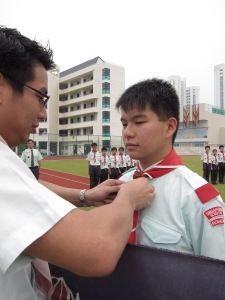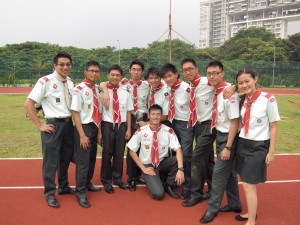This piece follows on pretty nicely from the previous post chronicling the recent history of Rovering in Singapore. Back then, I recall having a discussion with Kian Wee and David while we were reviewing the POR (For the uninitiated, thats Policy, Organisation and Rules) for the Rover Section.
The general view was that only a person upwards of 30 years old could be an effective RSL, because we felt then, as I do now, that a greater degree of maturity is required of the RSLs and ARSLs than any other section, due to the relative maturity of the youths in that section. We toyed with the idea of raising the minimum age requirement to 30 for RSLs and 25 for ARSLs. However, for practical reasons, we retained the existing age requirements. With the recent update in POR, I notice that the age requirements are 30 and 25 respectively. This is a good and sensible requirement, but I genuinely wonder how many can abide by them.
“The biggest problem with communication is the illusion that it has been accomplished” – George Bernard Shaw
The above truly encapsulates my stint as an RSL, which is coming to three years now, and indeed as one of the more senior young (yes young, though some of you might disagree with me) leaders in the group. I’m into my 8th year as a leader and the theme of communication and the illusion that it had been accomplished is a recurrent one during my time, and even when I thought I could not have communicated more, it recurred again. So a word of caution to would-be leaders, communication is an ongoing process, and is a delicate one.
To begin the reflection, I have to look back on my years as a Scout, Venture and Rover. As a Scout and especially as a Venture, I was fiercely independent, and took any attempt to ‘over-guide’ me as an attempt to micromanage, and I chafed at such restrictions. As a Rover, I, along with other regular helpers, had a particular bugbear. We really disliked seniors who appeared only from time to time but loved to impose their views and give negative comments/orders/instructions. Suggestions and views are fine, don’t get me wrong, but attempts to get us to see their view without any consideration of the greater context were hard to swallow, and we used to complain about them ad-nauseum.
With this in mind, I was naturally very careful not to be like this during periods when I was not active, or not as active as before, like now, as the RSL. While RSL duties are not light, they cannot compare to the period when I was an active leader, serving almost every weekend as a volunteer. Then, I knew the names of every Scout and Venture. Now, I’m the RSL, who is once removed from direct interaction with the Scouts and Ventures. Once I was no longer active, I deliberately held my tongue and refrained from commenting or getting involved, viewing it as “leaving it in the capable hands of the juniors”, who would naturally ask for help/support if they needed it. So strong were my underlying assumptions that they would naturally understand my point of view and what I was doing that I did not even tell them that.
This was perceived as reticence by juniors who thought that this behaviour was driven by tiredness and a wish to get away from the hustle and bustle of actively running the unit. While I was tired, and didn’t have the energy level to be there weekly anymore, it was primarily driven by work demands, and it was far from true that I did not care.
Things came to a head and only then did they understand why I had basically left them to their own devices. Lesson learnt once. We had left important understandings unspoken, and this resulted in inaccurate assumptions by both sides.
Recently, a large batch of new Rovers were invested. While previously the unit consisted only of about 8 Rovers, a batch of 10 joined us from the Venture unit. Miscommunication arose again, though this time it was not a big issue. The growth of the Rover unit from 8 Rovers across 2 batches to about 18 Rovers across 3 batches meant that coordination would become an issue. While in Venturing, there were clear protocols and structures in place, so Ventures knew who to approach when in need.
It had not been as clear in the Rover unit. While we had structures, these were unofficial modus operandi that worked for us. For a newbie coming into such a system, it could not be more confusing. We had not taken the time to let the newly minted Rovers know how things operated in the Rover unit, they felt excluded and did not know how to go about their roles.
This is also a pretty common feeling when you take up a new job. “Want to be ‘on’ also don’t know how to go about being ‘on’.” is how my former boss put it.
We needed to clearly communicate about how we communicated (so meta…), so now we officially have coordinators for each batch, and points of contact for Scout unit matters and Venture unit matters.
It is a learning process for all of us, including purportedly experienced leaders like myself, not to take how we do things for granted.
